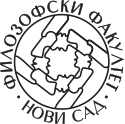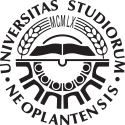15EJEJ75 - Cognitive Semantics
| Course specification | ||||
|---|---|---|---|---|
| Course title | Cognitive Semantics | |||
| Acronym | 15EJEJ75 | |||
| Study programme | English language and literature | |||
| Module | ||||
| Type of study | first degree undergraduate academic studies | |||
| Lecturer (for classes) | ||||
| Lecturer/Associate (for practice) | ||||
| Lecturer/Associate (for OTC) | ||||
| ESPB | 3.0 | Status | ||
| Condition | Lexical Semantics and Pragmatics | Oblik uslovljenosti | ||
| The goal | Students should gain knowledge about the main concepts and terms in the field of cognitive semantics; they should understand the most important means of man`s conceptualization – categorization, semantic frames, conceptual metaphors and metonymies; students should understand the cultural grounding of different linguistic and cognitive phenomena. | |||
| The outcome | Theoretical aspects: Students have acquired the relevant knowledge, concepts and terms. Practical aspects: Students are able to actively apply theoretical knowledge to specific cases, examples from the English language and culture; students are able to discern nuances of meaning in English as well as linguistic and cultural peculiarities. | |||
| Contents | ||||
| Contents of lectures | Theoretical: Cognitive semantics – the approach to meaning: semantic structure, conceptual structure, encyclopedic knowledge, meaning constuction. Experiential realism. Relativity in viewing the outer world (interpretation, perspective, figure). Categorization: prototypes. Semantic frames – definition and application to understanding linguistic expressions. Conceptual metaphor and metonymy – definitions and application to the study of language: polysemy (literal and transferred meaning), idioms. The cultural aspect – universality and variation in relation to prototypes, semantic frames, conceptual metaphor and metonymy. | |||
| Contents of exercises | Practising the taught topics and issues by applying knowledge to concrete, prepared tasks. | |||
| Literature | ||||
| ||||
| Number of hours per week during the semester/trimester/year | ||||
| Lectures | Exercises | OTC | Study and Research | Other classes |
| 2 | 1 | |||
| Methods of teaching | Frontal instruction; discussions about the taught topics, tasks and previously read articles; students doing prepared practical tasks independently. | |||
| Knowledge score (maximum points 100) | ||||
| Pre obligations | Points | Final exam | Points | |
| Activites during lectures | 10 | Test paper | 60 | |
| Practical lessons | Oral examination | |||
| Projects | ||||
| Colloquia | 30 | |||
| Seminars | ||||

